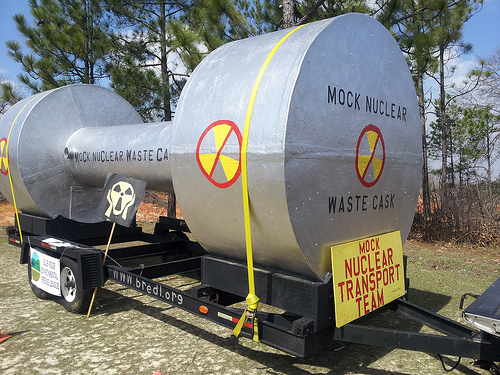- Blog
- Food & Agriculture
- South Carolina does not consent to being the nation’s nuclear waste dump
South Carolina does not consent to being the nation’s nuclear waste dump

Donate Now!
Your contribution will benefit Friends of the Earth.
Stay Informed
Thanks for your interest in Friends of the Earth. You can find information about us and get in touch the following ways:
Finding a new home for old waste
Tuesday, Aiken, S.C., became the first community to reject a new nuclear waste dump.
Back in 2010 President Obama found himself stuck between a rock and a hard place. Sen. Reid had stopped plans for a nuclear waste repository at Yucca Mountain, Nev., dead in its tracks and the backlog of U.S. spent nuclear fuel was only growing. In classic diplomatic style, President Obama delegated the decision about what to do with nuclear waste to the Secretary of Energy, who established the “Blue Ribbon Commission on America’s Nuclear Future”
The following were among the Commission’s key final recommendations, made in January 2011:
- the establishment of one or more “consolidated interim storage” facilities that would house spent nuclear fuel until a permanent disposal site can be prepared; and
- that future consolidated interim storage and permanent repository facilities be sited through a consent-based process.
Following these recommendations there was a flurry of speculation about which communities might consent to housing a nuclear waste dump. “Boosters” for projects at the Department of Energy’s Savannah River Site in South Carolina began clamoring for the federal government to bring nuclear waste to the state. Nuclear industry insiders favor the Savannah River Site because they hope the waste would make its way to the Savannah River Site where it would eventually justify the reprocessing of the spent fuel to remove weapons-usable plutonium.
South Carolinians know better
Reprocessing is a thoroughly dirty process which creates a host of hard-to-manage waste streams. This was the process used at SRS to separate weapons-grade plutonium from materials taken from five military reactors on the site. All of the plutonium “triggers” in U.S. nuclear weapons was created through reprocessing. Much of the waste created during plutonium trigger production is still sitting in massive underground tanks at the Savannah River Site, waiting to be treated for final disposal.
South Carolinians know about the backlog of high level nuclear waste at SRS. They know about the treated waste sitting at the SRS, waiting for a permanent site to move to. They know to be skeptical about the “interim” nature of any future “consolidated storage” facilities.
While other states, like Idaho, shut their doors to more nuclear waste long ago; the SRS Citizen Advisory Board is the first government affiliated group to reject the Blue Ribbon Commission’s invitation for consent. While the Blue Ribbon Commission wasn’t very clear about whose consent they are soliciting, it’s likely that groups like the Department of Energy affiliated SRS Citizen Advisory Board, a legally mandated federal advisory panel made up of local community members, will have more clout than civilian groups.
On July 23, the SRS Citizen Advisory Board voted 17-6 to support “the Position Paper for the Savannah River Site’s Citizen Advisory Board on Using SRS for Interim Storage of Spent Nuclear Fuel.” This paper roundly rejects the idea that SRS is a suitable location for a consolidated storage facility, stating “future generations of South Carolinians and Georgians will not be well served by having the Savannah River Site become an interim storage site for commercial nuclear waste, and for what will be an undetermined length of time”
The Senate moves ahead
The SRS Citizen Advisory Board cast its vote at a critical time, exactly one week before the Senate Energy and Natural Resources Committee holds a hearing on nuclear waste. The July 30 hearing is meant to support S.1240, a flawed bill rewriting the rules for storing nuclear waste. Senators who want to get spent nuclear fuel out of their own states are driving this effort based on the Blue Ribbon Commission’s recommendations.
The Nuclear Waste Administration Act of 2013, as S.1240 is also known, would sever the decades old link between centralized storage facilities and a permanent repository. Severing this link puts any centralized storage facility at risk of becoming a de facto permanent disposal site, as the SRS Citizen Advisory Board is keenly aware.
Backers of spent fuel storage and reprocessing at the Savannah River Site have suffered a big defeat with the Savannah River Site’s Citizen Advisory Board vote but they will likely regroup and re-emerge with a different version of the same old approach. When that happens, citizens who oppose turning SRS into the nation’s spent fuel dump will be well armed to once again turn back that effort.
Photo Credit: Ayman Fadel
